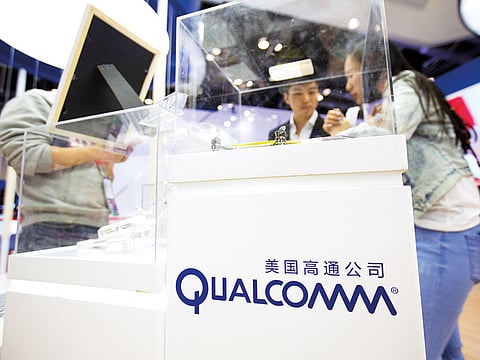Qualcomm gets $1.2b EU fine for Apple chip payments
Qualcomm struck a deal with Apple in 2011

Brussels
Qualcomm Inc was fined 997 million euros ($1.2 billion) by the European Union for paying Apple Inc to shun rival chips in its iPhones.
The largest maker of chips that help run smartphones “paid billions of US dollars to a key customer, Apple, so that it would not buy from rivals,” EU Competition Commissioner Margrethe Vestager said in an emailed statement on Wednesday. “This meant that no rival could effectively challenge Qualcomm in this market, no matter how good their products were.”
Qualcomm struck a deal with Apple in 2011 that pledged significant payments if Apple only used Qualcomm chipsets for the iPhone and iPad devices. That agreement was renewed in 2013 until 2016. Qualcomm warned it would stop these payments if Apple sold another product with a rival chip. This effectively shut out competitors such as Intel Corp. from the market for LTE baseband chipsets used in the 4G mobile phone standard for five years, the EU said.
The EU moves come as Qualcomm tries to fend off a $105 billion hostile takeover by rival Broadcom Ltd and wages war with Apple in numerous court cases around the world over patent licensing. Qualcomm rejected Broadcom’s offer last year, telling shareholders that the bid undervalued the company and “comes with significant regulatory uncertainty.”
Shares in Qualcomm fell 2.86 per cent at 12:15pm in Frankfurt.
Intel chips
“Apple was seriously thinking of switching” from Qualcomm to Intel chips “which would have made a big difference to Intel,” Vestager told reporters at a Brussels press conference. “It would have cost Apple a lot of money” if it switched chips while the deal was in place and it only started to source from Intel when the agreement was about to expire in September 2016.
“The outcome is that rivals are prevented from challenging dominant companies with more innovative products,” Vestager said. The fine represents 4.9 per cent of Qualcomm’s revenue in 2017, the EU said.
Vestager said the decision sends a warning to other companies who would contemplate using similar practices: “Don’t go there.”
Qualcomm, Apple and Intel representatives didn’t immediately respond to requests for comment.
Apple in clear
When asked whether Apple also bears any responsibility for the practice, Vestager said this is about Qualcomm and there’s no evidence of wrongdoing from the Cupertino, California-based company.
The case has parallels with the EU’s 2009 finding that Intel’s rebates to computer manufacturers and payments to a retailer were aimed at squeezing out a smaller chipmaker. The EU’s top court has ordered a lower tribunal to re-examine Intel’s appeal and weigh whether the EU can merely assume that such tactics are illegal without proving they were harmful to rivals and competition.
It’s the first time the EU has landed a blow on Qualcomm, nearly a decade after officials dropped a four-year probe in 2009 into how it licensed patents used in the 3G phone standard. There was no fine or any finding that Qualcomm violated antitrust rules in that case.
Wednesday’s decision concludes one of two EU antitrust probes targeting the US company. The second EU probe, still underway, centers on whether Qualcomm deliberately sold chipsets for “dongles” — plug in devices that connect computers to the internet — at below-cost from 2009 to 2011 to hinder competitor Icera, now owned by Nvidia Inc That case has escalated with a court dispute over information the EU sought from the company. Qualcomm was threatened with additional daily fines for not quickly supplying data the EU wanted.
Apple and Qualcomm have been waging legal battles over the world. Apple says Qualcomm charges too much and is leveraging its strong market position in chips illegally. Qualcomm counters that Apple, one of its largest customers, has lied to regulators in an unfair attempt to bully it into charging less.



